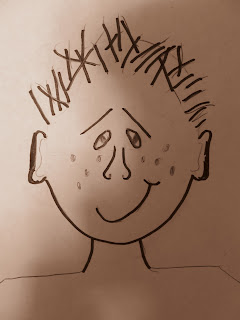 There was (maybe still is) a restaurant in the Georgetown area of Washington, D.C. called The Blue Mirror. I used to go there to drink German beer -- dark and sour in my mouth. My friends and I were demonstrating our sophistication. In those days, the law in D.C. allowed eighteen year olds to drink beer and wine -- no hard liquor though until age twenty-one.
There was (maybe still is) a restaurant in the Georgetown area of Washington, D.C. called The Blue Mirror. I used to go there to drink German beer -- dark and sour in my mouth. My friends and I were demonstrating our sophistication. In those days, the law in D.C. allowed eighteen year olds to drink beer and wine -- no hard liquor though until age twenty-one.The restaurant's wall of blue-tinted mirrors showed a girl in her late teens, big-bones, slightly awkward-looking body but good facial features -- high cheekbones, well-shaped mouth, and eyes some people had said were "arresting." I would examine myself critically, self-consciously. Where, for instance, were my breasts? I mean, my real breasts, not those modest prepubescent swellings but the big generous melons I surely deserved.
Today's mirrors tell me I'm old and overweight. I can alter the latter, not the former. Whose is this wrinkled visage anyhow? This shriveled, apple doll grandmother? How did I get into her body? What did she do with mine?
Presumably I grew older month by month, year by year, until I arrived at this state. I don't think so, though. What I think is that I'm the victim of some evil sorcery. When and how this happened, I no longer remember. And why this particular transformation? I could have been turned into an aardvark. Or a pill bug coiled in the rich dark loam of my daughter's garden, plucked from the soil by my youngest grandson, later squashed under foot or given to the ducks to eat.
Is dying as a human any better than dying as a pill bug? I mean, death is death after all.
So...mirrors. Does anyone actually look in one and say, "By God, I'm beautiful!" I've never known anyone that did. At least not anyone sober. Mirrors tend to reflect our imperfections more than our assets.
If there were no mirrors, would anorexia even exist? Dysmorphia? Bulimia?
Would the world be a better place without mirrors? Or would we all be bending over ponds and lakes, cursing the breezes as we struggled to scrutinize and rate our physical attractability?
Turning to metaphor, one might suggest that children are their parents' mirrors. This is particularly true, I think, of mothers and daughters. In my daughter's mirror, for instance, I am an inappropriately-dressed, feeble-minded blabbermouth in need of stern rebuking. Whether this perceived impression says more about me than it does about her is any one's guess.
The earliest mirrors, I've read, were made of obsidian, a shiny black igneous rock. I have a small piece of it given to me by my middle grandson. When I'm in the mood for magical thinking, I imagine that it holds great power if only I knew how to work it.
Throughout history, mirrors have been fashioned using glass and various kinds of metals. During the Renaissance, only the rick and powerful could afford to own one.
These days, though, they are everywhere: in restaurants, cars, stores, people's homes. They catch you unawares and whisper silently, spitefully: "Too fat, too scrawny, too messy, too prissy, wrong color, wrong style, too young and fleshy, too old and saggy. You should hide your head under a rock; you should use a bed sheet to cover your body..."
I suppose I should conclude by presenting the positive side of mirrors. For instance, if you have a piece of lettuce lodged between your two front teeth, a mirror will alert you to that fact so you can remove it quickly before the people you're dining with notice. Unless, of course, they've already noticed.
Scrutinizing yourself in a mirror before you go out can prevent you from appearing in public with a large stain on your blouse or a shirt you pulled on hastily that you're presently wearing inside out.
If you're dedicated to wearing makeup, a mirror is essential and if you want to know what that lump is on the back of your neck, you will actually need two mirrors.
Mirrors are also used in scientific apparatus such as telescopes, lasers and cameras.
Mirrors became affordable for the masses in the mid nineteenth century.
Aren't you glad they did?

























